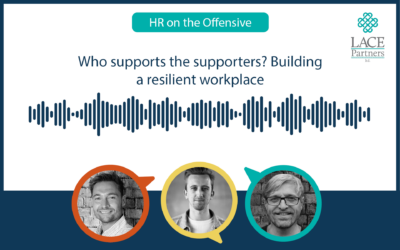The world of recruitment is undergoing a significant transformation, one that prioritises skills over traditional job roles. Chris and LACE Director Pavan Bilkhoo speak to Neil Carberry, CEO of the Recruitment and Employment Confederation (REC), on how businesses and recruiters are rethinking their approaches to talent acquisition and workforce management.
 Moving beyond job descriptions
Moving beyond job descriptions
The concept of transitioning to a skills-based organisation is becoming popular within modern workforce strategy – so much so that we are running our Becoming Skills-Powered campaign to unpack all the big questions around it!
Traditional job roles and rigid hierarchies are increasingly being replaced by a more flexible, task-driven approach. Neil points out that many organisations are still stuck in the habit of writing job descriptions that are outdated, while their real need is for specific skills for tasks to be completed. He advocates for moving beyond conventional job roles and focusing on what skills are necessary both now and for the future of your organisation.
The role of technology in recruitment
One of the key questions in recruitment today is the role of technology. Will advancements in automation replace recruiters? Neil believes that while technology will certainly change the nature of recruitment, it will not make human recruiters obsolete.
Instead, recruiters who can leverage technology effectively will outpace those who cannot. Automation can streamline processes, but the human element—understanding the nuances of both candidates and companies—remains crucial.
“Recruiters who can use technology well will take away the jobs from those who don’t.” – Neil Carberry
The focus for recruiters now should be on building relationships, understanding the specific needs of their clients, and acting as trusted advisors. This consultative approach, combined with technological tools, will allow recruiters create solutions that work for both candidates and employers.
The changing role of middle management
Another aspect of this transformation is the evolving role of middle management. For years, organisations have been thinning out middle management layers, focusing on leaner structures. However, Neil argues that this approach may no longer be suitable in today’s complex labour market. Middle managers play a critical role in understanding and implementing the new skills-driven approach within organisations; who better understands the skills required than those immersed in the work?
Middle management is crucial for translating the broader organisational strategy into actionable steps. This requires a mindset shift both at leadership level and for the managers themselves, thinking differently about the outcomes (the work) and how that can be broken down into tasks.
Recruitment as a strategic partner
As businesses evolve, so too must the recruitment industry. The role of recruiters is increasingly shifting from transactional to strategic. Neil envisions a future where recruitment agencies are not just filling roles but acting as long-term partners in workforce planning. This involves helping businesses think more strategically about their labour supply chains, just as they would about their marketing or operations.
One key aspect of this partnership is understanding the “triangle” of labour resourcing: what skills should be bought, borrowed, or grown internally.
- Buying skills: hiring experienced professionals, may be necessary for certain roles, but it can be expensive
- Borrowing skills: using temporary or contract workers can provide flexibility
- Growing skills internally: ensures that a company has a sustainable talent pipeline
As a strategic partner, recruitment agencies need to engage in deeper conversations with clients about their long-term goals and the skills they will need to achieve them. For this to work however, businesses need to rethink their relationships with recruitment agencies, treating them as valuable advisors rather than simply suppliers.
The future of work: what’s next?
Looking ahead, the recruitment industry is poised to play a central role in shaping the future of work. With the retirement of the baby boomer generation and the rise of younger generations like Gen Z and Gen Alpha, companies will need to adapt their approaches to hiring and workforce management. These younger workers will bring new expectations, and businesses must be poised to adapt.
Pavan predicts that new generation workers will have more careers throughout their lives, moving between different roles and industries. This will require businesses to be more agile and open to reskilling their workforce. He also emphasises the importance of continuous learning, as workers will need to update their skills regularly to stay competitive in the job market.
Ultimately, the future of recruitment lies in its ability to adapt to these changes. By focusing on skills, embracing technology, and building strong relationships with clients and candidates, the recruitment industry can help businesses navigate the complexities of the modern workforce.
As Neil notes, “It’s about building a more long-term approach in our economic thinking” one that prioritises skills and flexibility for a more prosperous future.
Want to be notified when the newest episode is released? Join here for HR on the Offensive podcast LinkedIn group.






